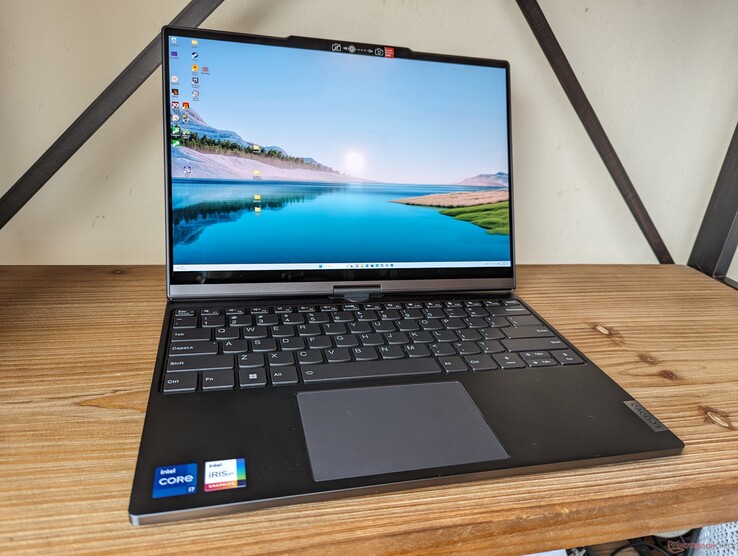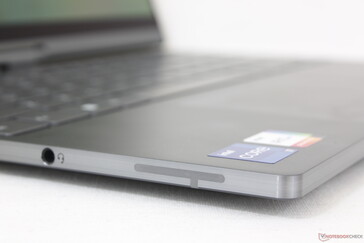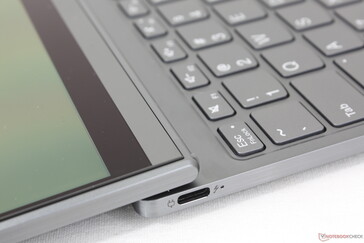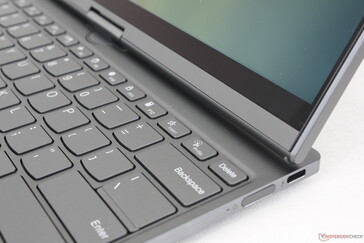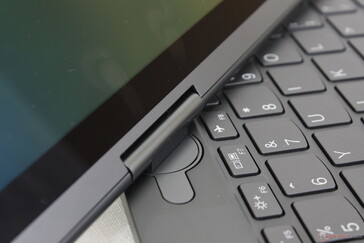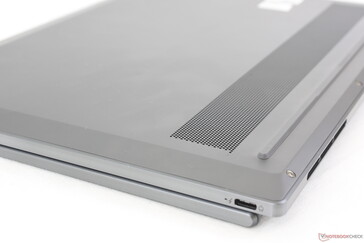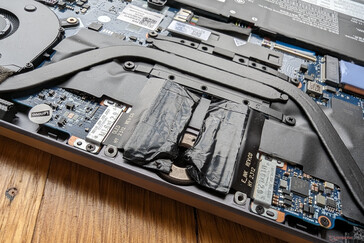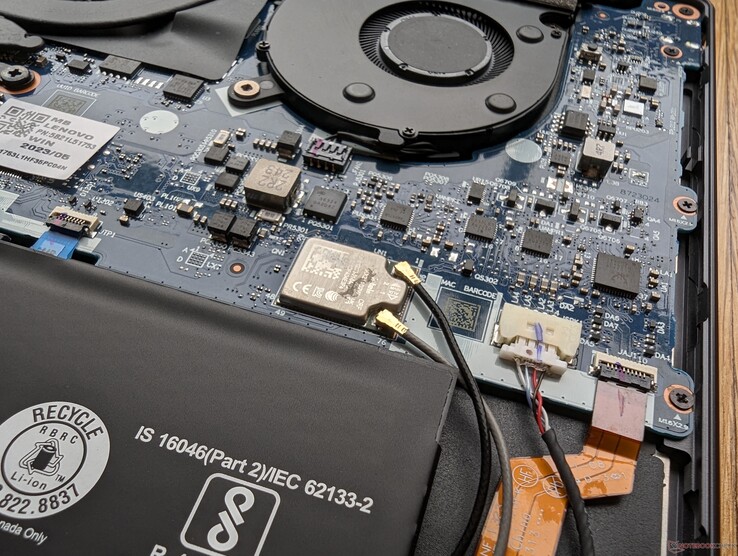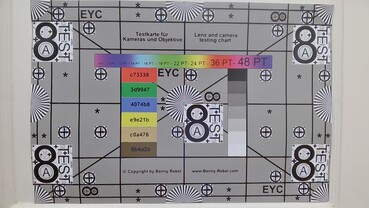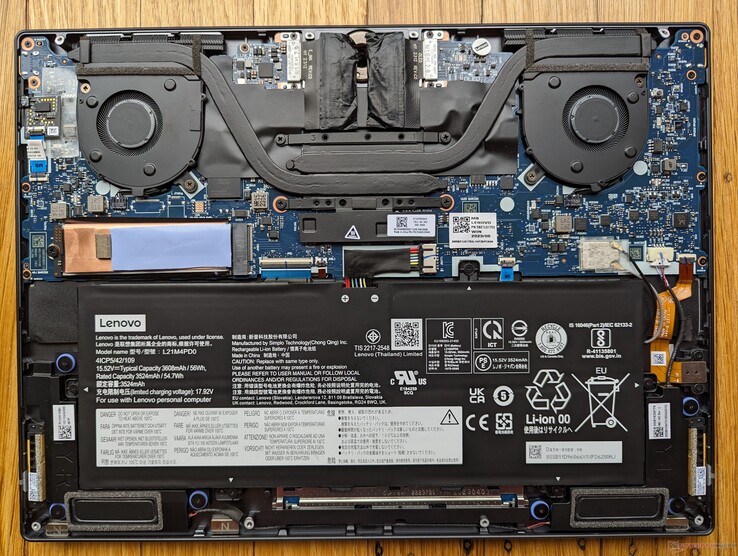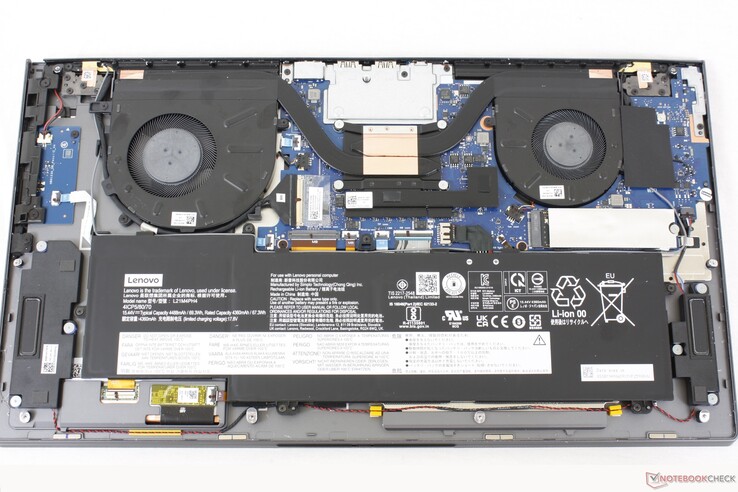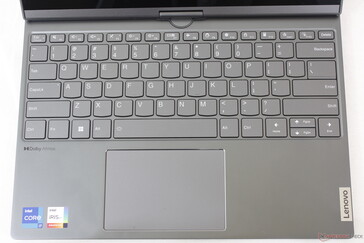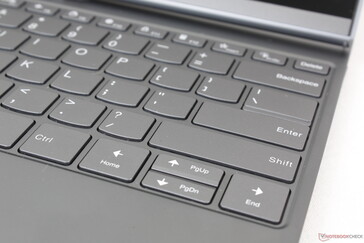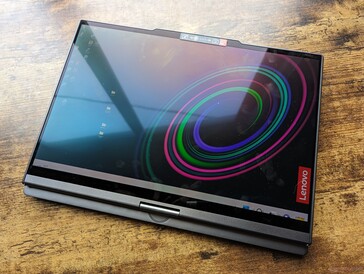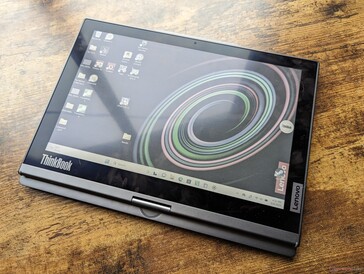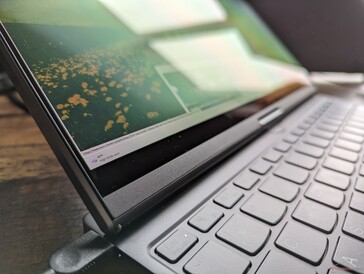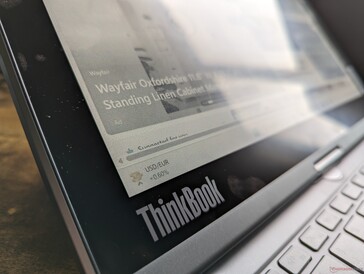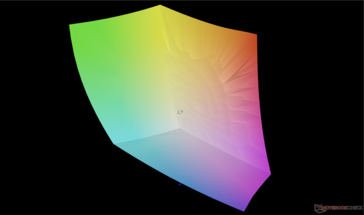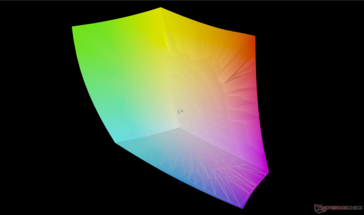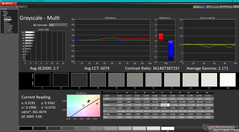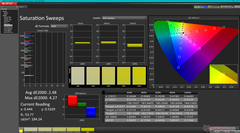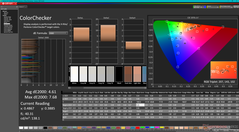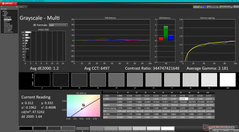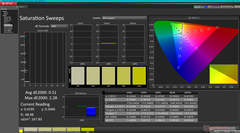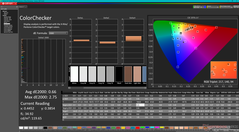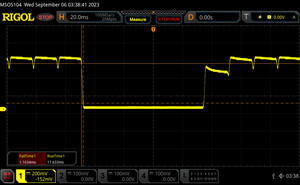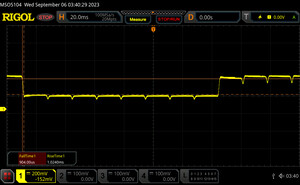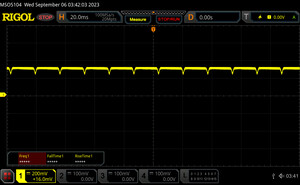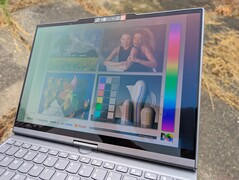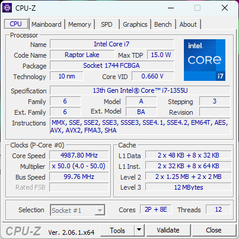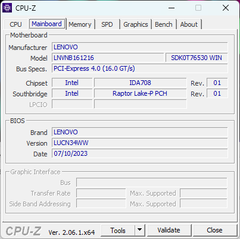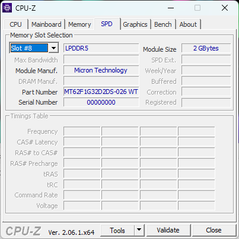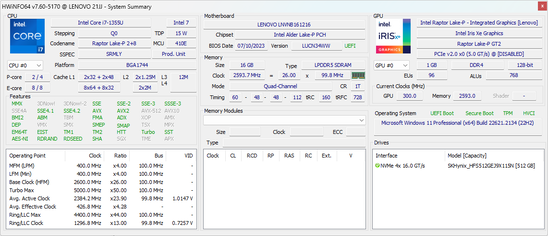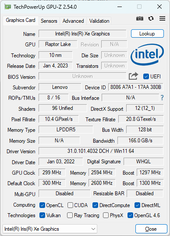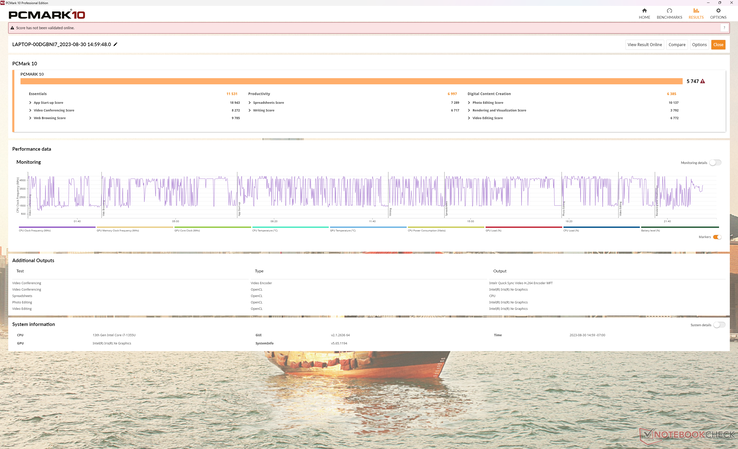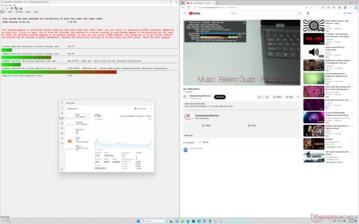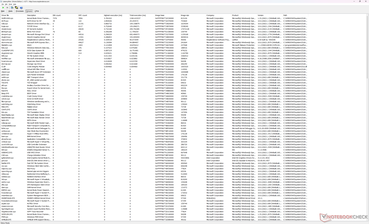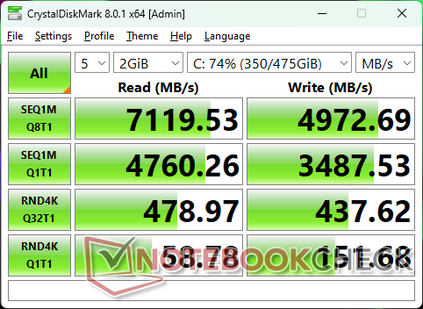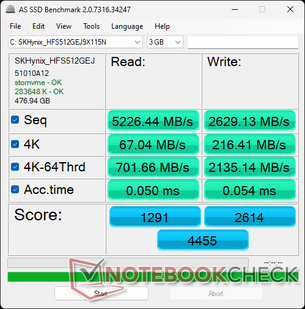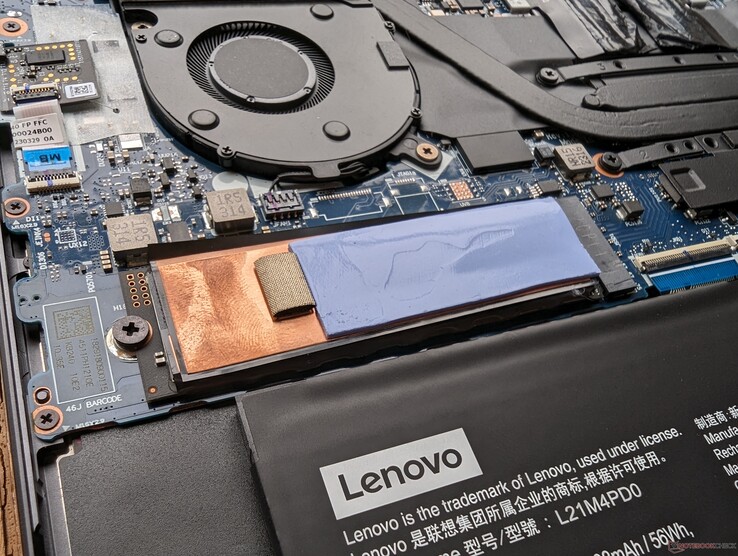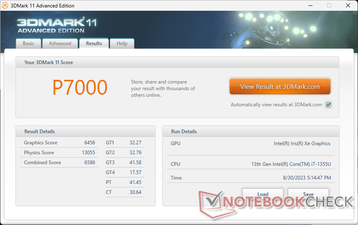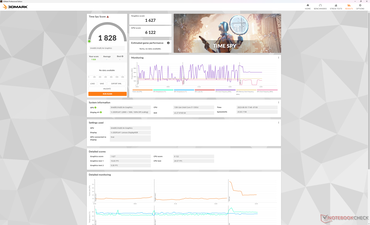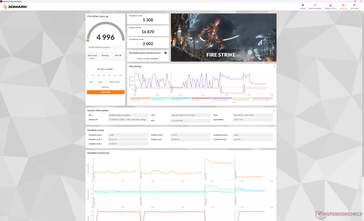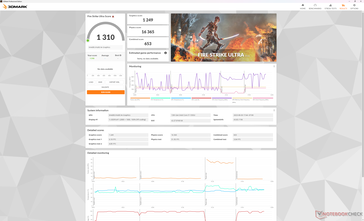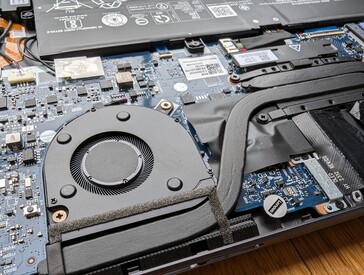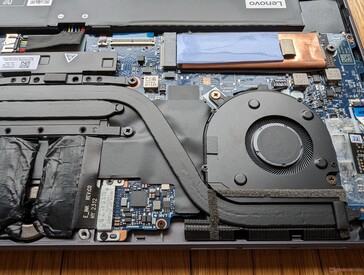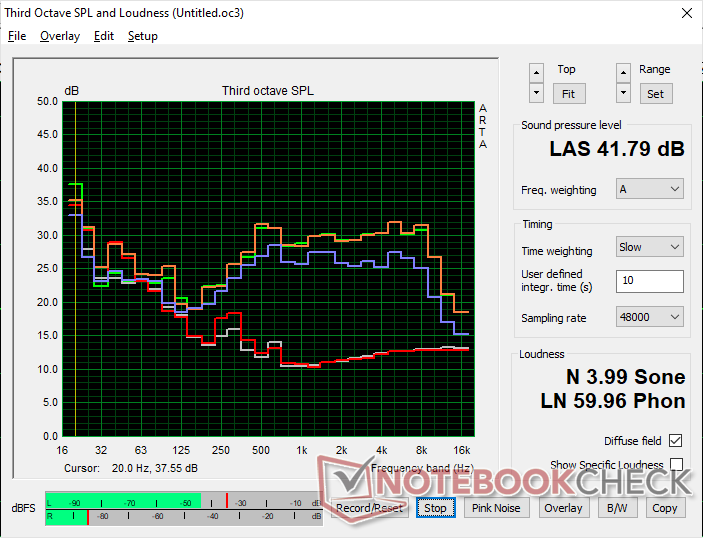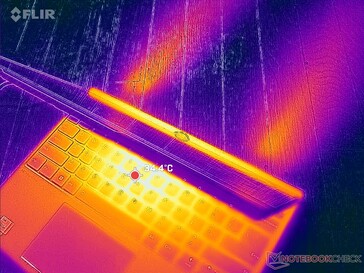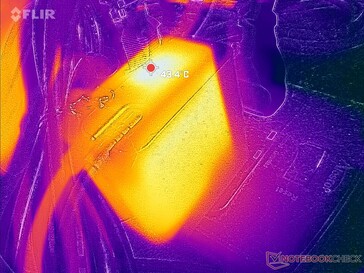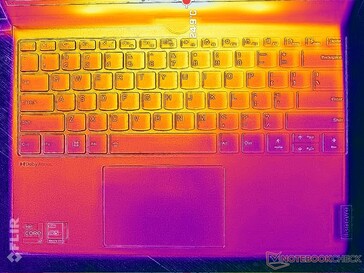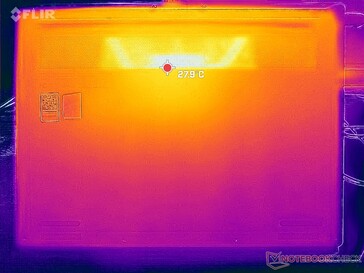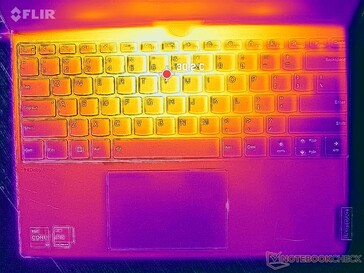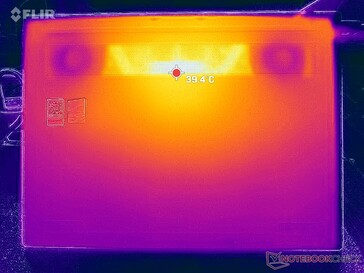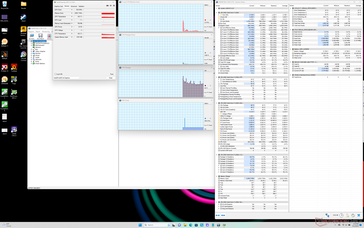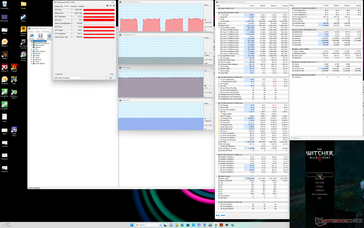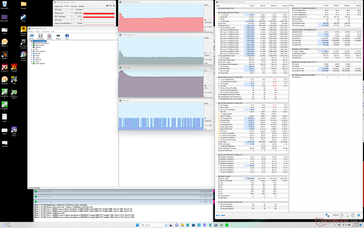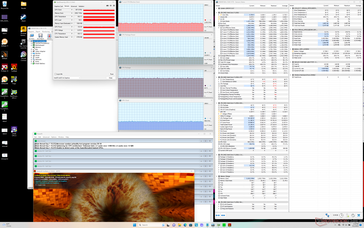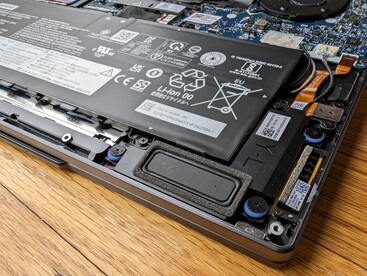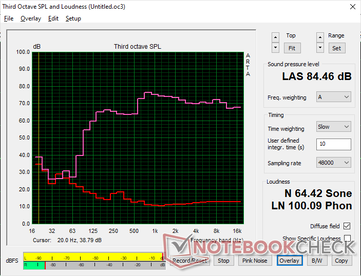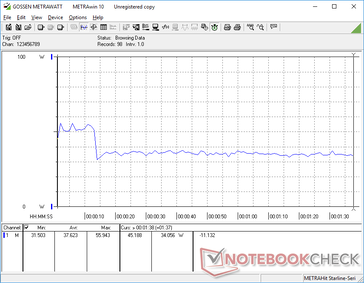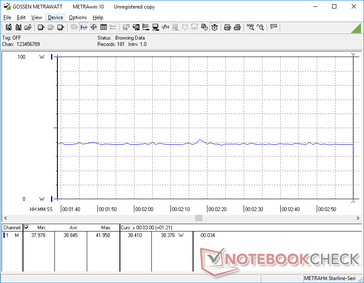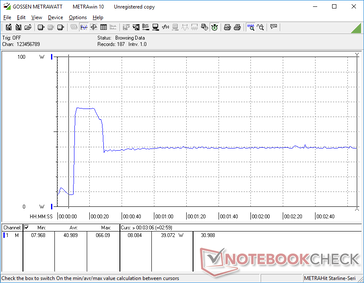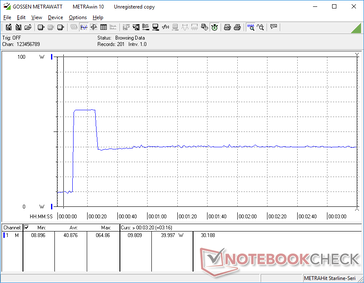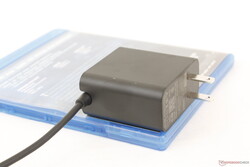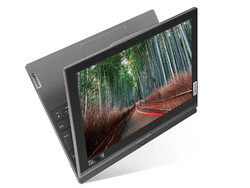Test du Lenovo ThinkBook Plus Twist Gen 4 : hybride E-Ink et OLED

Le Lenovo ThinkBook Plus Gen 4, également connu sous le nom de ThinkBook Plus Twist, est désormais largement disponible après avoir été dévoilé au CES 2020, à l'occasion d'une conférence de presse dévoilé au CES 2023. Malgré son nom, le ThinkBook Plus Gen 4 ne remplace pas directement le ThinkBook Plus Gen 3 en raison de leurs philosophies de conception et de leurs tailles d'écran très différentes. Ils partagent toutefois des matériaux de châssis similaires et ciblent les mêmes utilisateurs semi-professionnels qui pourraient être rebutés par la série IdeaPad centrée sur le consommateur ou la série ThinkPad axée sur la bureautique.
L'appareil que nous avons examiné est un modèle haut de gamme équipé d'un processeur Core i7-1355U et d'un écran E Ink intégré, pour un peu plus de 3 000 euros. Des configurations plus modestes sont proposées avec le Core i5-1335U sans écran E Ink pour 2800 USD, mais toutes les options sont livrées avec une carte graphique intégrée, 16 Go de RAM soudée et un écran tactile OLED de 13,3 pouces 2,8K.
Les concurrents comprennent d'autres ordinateurs portables convertibles haut de gamme comme le Dell Latitude 9330, MSI Summit E14 Flip, Asus ZenBook Flip 14ou le HP Spectre 13.5 series. Bien sûr, aucun n'offre les fonctionnalités de l'écran tactile E Ink comme notre Lenovo.
Plus d'avis Lenovo :
Comparaison avec les concurrents potentiels
Note | Date | Modèle | Poids | Épaisseur | Taille | Résolution | Prix |
|---|---|---|---|---|---|---|---|
| 87.4 % v7 (old) | 09/23 | Lenovo ThinkBook Plus Gen4 IRU i7-1355U, Iris Xe G7 96EUs | 1.4 kg | 17.7 mm | 13.30" | 2880x1800 | |
| 89.5 % v7 (old) | 08/23 | Lenovo ThinkPad X1 Nano Gen 3 i7-1360P, Iris Xe G7 96EUs | 989 g | 14.8 mm | 13.00" | 2160x1350 | |
| 91.9 % v7 (old) | 07/23 | HP Dragonfly G4 i7-1365U, Iris Xe G7 96EUs | 1.1 kg | 16.3 mm | 13.50" | 1920x1280 | |
| 85.4 % v7 (old) | 05/23 | Asus ZenBook S13 OLED UX5304 i7-1355U, Iris Xe G7 96EUs | 1 kg | 11.8 mm | 13.30" | 2880x1800 | |
| 89 % v7 (old) | 11/22 | Dell Latitude 9330 i7-1260U, Iris Xe G7 96EUs | 1.2 kg | 14.1 mm | 13.30" | 2560x1600 | |
| 86.9 % v7 (old) | 04/21 | MSI Summit E13 Flip Evo A11MT i7-1185G7, Iris Xe G7 96EUs | 1.4 kg | 14.9 mm | 13.40" | 1920x1200 |
Top 10
» Le Top 10 des PC portables multimédia
» Le Top 10 des PC portables de jeu
» Le Top 10 des PC portables de jeu légers
» Le Top 10 des ordinateurs portables bureautiques
» Le Top 10 des PC portables bureautiques premium/professionnels
» Le Top 10 des Stations de travail mobiles
» Le Top 10 des Ultraportables
» Le Top 10 des Ultrabooks
» Le Top 10 des Convertibles
» Le Top 10 des Tablettes
» Le Top 10 des Tablettes Windows
» Le Top 10 des Smartphones
» Le Top 10 des PC Portables á moins de 300 euros
» Le Top 10 des PC Portables á moins de 500 euros
» Le Top 25 des meilleurs écrans d'ordinateurs
Etude de cas - L'esprit du ThinkPad Twist perdure
Contrairement à d'autres modèles de ThinkBook comme le ThinkBook 15 G3le ThinkBook Plus Gen 4 utilise plus de métal que de plastique pour une sensation plus luxueuse qui reflète mieux sa gamme de prix élevée. La base, par exemple, est nettement plus résistante aux torsions et aux craquements, ce qui la place au même niveau que le HP Spectre x360 13.5. Le couvercle est également assez ferme en raison de la présence de deux panneaux de verre renforcés pour les écrans OLED et E Ink, alors que la plupart des autres ordinateurs portables n'en ont qu'un.
Outre l'écran tactile E Ink de 12 pouces situé sur le couvercle extérieur, le mécanisme de rotation contribue également à différencier le modèle Lenovo de la plupart des autres ordinateurs convertibles du marché. La petite charnière peut être tournée de 180 degrés dans le sens des aiguilles d'une montre pour le mode tablette, puis de 180 degrés dans le sens inverse des aiguilles d'une montre pour le mode ordinateur portable, ce qui contraste avec les charnières standard de 360 degrés des convertibles habituels. Cela fonctionne bien d'un point de vue mécanique, mais le couvercle a tendance à vaciller plus facilement que les charnières traditionnelles plus grandes. Espérons que cette charnière rotative unique résistera à plusieurs années d'utilisation quotidienne.
Le mécanisme de rotation et l'écran secondaire ajoutent un peu d'épaisseur et de poids par rapport aux ordinateurs portables 13 pouces standard. Le Dragonfly G4par exemple, est presque de la même taille dans les trois dimensions, mais il est nettement plus léger de 300 grammes, ce qui le rend plus facile à transporter. Par conséquent, vous devrez vraiment apprécier les caractéristiques uniques du ThinkBook Plus Gen 4 pour justifier son poids supplémentaire.
Connectivité
Le modèle n'intègre que deux ports Thunderbolt 4 et une prise audio de 3,5 mm. Ce dernier point est remarquable, car quelques subnotebooks comme le ZenBook 13 n'ont pas de prise casque du tout. Préparez-vous à avoir des adaptateurs et des stations d'accueil si vous prévoyez de connecter des périphériques USB-A ou HDMI.
Nous apprécions le fait qu'il y ait un port USB-C sur chacun des deux côtés de l'ordinateur portable, ce qui signifie que vous pouvez charger l'ordinateur portable d'un côté ou de l'autre. Cela contraste avec le Spectre x360 13.5 qui ne peut se charger que par le bord droit.
Communication
Un Intel AX211 est livré en standard pour le Wi-Fi 6E et le Bluetooth 5.2. Les taux de transfert sont fiables et plus ou moins stables lorsqu'ils sont couplés à notre routeur de test Asus AXE11000 6GHz.
les options 4G LTE ou 5G ne sont malheureusement pas prises en charge puisqu'il ne s'agit pas d'un ThinkPad.
| Networking | |
| iperf3 transmit AX12 | |
| MSI Summit E13 Flip Evo A11MT | |
| iperf3 receive AX12 | |
| MSI Summit E13 Flip Evo A11MT | |
| iperf3 transmit AXE11000 | |
| Asus ZenBook S13 OLED UX5304 | |
| Lenovo ThinkBook Plus Gen4 IRU | |
| Lenovo ThinkPad X1 Nano Gen 3 | |
| HP Dragonfly G4 | |
| Dell Latitude 9330 | |
| iperf3 receive AXE11000 | |
| Asus ZenBook S13 OLED UX5304 | |
| Lenovo ThinkPad X1 Nano Gen 3 | |
| Lenovo ThinkBook Plus Gen4 IRU | |
| HP Dragonfly G4 | |
| Dell Latitude 9330 | |
| iperf3 transmit AXE11000 6GHz | |
| Lenovo ThinkBook Plus Gen4 IRU | |
| Lenovo ThinkPad X1 Nano Gen 3 | |
| HP Dragonfly G4 | |
| Dell Latitude 9330 | |
| iperf3 receive AXE11000 6GHz | |
| Lenovo ThinkBook Plus Gen4 IRU | |
| Lenovo ThinkPad X1 Nano Gen 3 | |
| HP Dragonfly G4 | |
| Dell Latitude 9330 | |
Webcam
Une webcam de 2 mégapixels avec obturateur coulissant et infrarouge est fournie en standard. Des concurrents comme HP ont déjà commencé à livrer des ordinateurs portables dotés de capteurs de 5 MP et même de 8 MP et même des capteurs de 8 MP pour des images plus nettes.
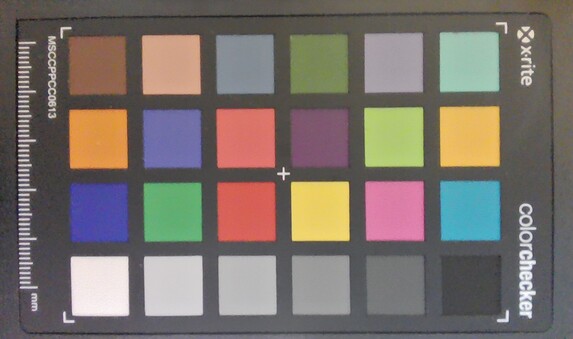
Maintenance
Le panneau inférieur est fixé par huit vis Torx T5 pour un entretien relativement rapide. Malgré cela, il n'y a pas grand-chose à améliorer car seuls le SSD M.2 et la batterie sont facilement amovibles, ce qui est une caractéristique commune aux ordinateurs portables convertibles.
Accessoires et garantie
La boîte contient un Lenovo Digital Pen 2 et une pile AAA, ainsi que les documents habituels et l'adaptateur secteur. Malheureusement, il n'y a pas d'aimant sur l'ordinateur portable pour attacher ou fixer le stylet et vous devrez donc le garder dans votre poche ou votre sac pour un transport plus sûr.
Périphériques d'entrée - pourraient être améliorés
Clavier
Le clavier est mitigé car il donne l'impression d'avoir été relégué au second plan par rapport à l'écran. Plus précisément, les touches sont plus spongieuses que ce à quoi nous sommes habitués, même par rapport à d'autres modèles d'IdeaPad. La touche Espace est particulièrement frustrante car sa moitié droite est plus spongieuse que la moitié gauche lorsqu'elle est pressée. Quant aux touches Entrée et Retour arrière, elles sont moins profondes qu'on ne le souhaiterait. Lenovo est généralement très bon lorsqu'il s'agit des claviers des ThinkPad et il est donc un peu décevant de voir qu'ils ont raté le coche sur le ThinkBook Plus Gen 4.
Pavé tactile
Le pavé tactile (10,5 x 7 cm) est plus grand que celui du ThinkPad X1 Nano Gen 3 (10 x 5,6 cm) tout en étant plus petit que celui du Dragonfly G4 (12 x 8 cm). Il est très sensible à la pression et offre un retour d'information plus satisfaisant que les pavés tactiles plus souples ou plus spongieux de la plupart des autres ordinateurs portables. Les bruits sont donc plus aigus et plus forts, mais le compromis en vaut la chandelle.
Affichages - L'attraction principale
L'écran tactile principal possède toutes les qualités de base que nous attendons de l'OLED, notamment des temps de réponse extrêmement rapides, des niveaux de noir parfaits et une couverture complète des couleurs P3. Le point le plus négatif de notre écran est peut-être son taux de rafraîchissement limité à 60 Hz. L'écran Asus ZenBook et VivoBook sont livrés avec des panneaux OLED de 90 Hz ou 120 Hz depuis un certain temps déjà, qui semblent instantanément plus fluides et plus réactifs lorsqu'il s'agit de navigation et de commandes tactiles. Espérons que de tels écrans seront plus largement disponibles si Lenovo décide de mettre à jour ce modèle à l'avenir.
| Écran | Taille de l'écran | Résolution native | Taux de rafraîchissement natif | Luminosité maximale nominale |
| Encre E | 12 pouces | 2560 x 1600 | 12 Hz | 100 nits |
| OLED | 13.3 pouces | 2880 x 1800 | 60 Hz | 400 nits |
L'écran E Ink présente deux inconvénients notables. Tout d'abord, sa résolution native est inférieure à celle de l'écran OLED principal, ce qui pose des problèmes lorsque Windows passe d'un écran à l'autre. Tout votre contenu est redimensionné et repositionné chaque fois que vous changez d'écran, ce que vous devez ensuite corriger manuellement. Un rapport de résolution de 1:1 entre les deux écrans aurait permis de résoudre ce problème gênant.
Le deuxième problème est lié à la lourdeur de l'écran tactile E Ink, même si l'on tient compte de la lenteur des temps de réponse. Cela est principalement dû au fait que le système d'exploitation Windows n'est pas optimisé pour les lecteurs électroniques. La rotation automatique, par exemple, ne fonctionne pas de manière fiable en mode eReader et les écrans mettent plusieurs secondes à se charger lorsque l'on passe d'un écran à l'autre. La phase de transition n'est donc pas aussi fluide que le simple passage du mode ordinateur portable au mode tablette sur les modèles convertibles traditionnels dotés d'un seul écran.
| |||||||||||||||||||||||||
Homogénéité de la luminosité: 98 %
Valeur mesurée au centre, sur batterie: 367.5 cd/m²
Contraste: ∞:1 (Valeurs des noirs: 0 cd/m²)
ΔE ColorChecker Calman: 4.61 | ∀{0.5-29.43 Ø4.76}
calibrated: 0.66
ΔE Greyscale Calman: 2.7 | ∀{0.09-98 Ø5}
97.1% AdobeRGB 1998 (Argyll 3D)
100% sRGB (Argyll 3D)
99.6% Display P3 (Argyll 3D)
Gamma: 2.17
CCT: 6079 K
| Lenovo ThinkBook Plus Gen4 IRU SDC ATNA33AA06-0, OLED, 2880x1800, 13.3" | Lenovo ThinkPad X1 Nano Gen 3 MND007ZA1-3, IPS, 2160x1350, 13" | HP Dragonfly G4 Chi Mei CMN13C0, IPS, 1920x1280, 13.5" | Asus ZenBook S13 OLED UX5304 SDC417B, OLED, 2880x1800, 13.3" | Dell Latitude 9330 AU Optronics B133QAA, IPS, 2560x1600, 13.3" | MSI Summit E13 Flip Evo A11MT Sharp LQ134N1JW53, IPS, 1920x1200, 13.4" | |
|---|---|---|---|---|---|---|
| Display | -20% | -20% | 0% | -14% | -19% | |
| Display P3 Coverage (%) | 99.6 | 68.5 -31% | 68.4 -31% | 99.7 0% | 77.8 -22% | 69.8 -30% |
| sRGB Coverage (%) | 100 | 99.5 0% | 98.3 -2% | 100 0% | 99.9 0% | 98.8 -1% |
| AdobeRGB 1998 Coverage (%) | 97.1 | 69.7 -28% | 70.4 -27% | 96.9 0% | 77.5 -20% | 70.6 -27% |
| Response Times | -1565% | -1929% | 10% | -2879% | -2632% | |
| Response Time Grey 50% / Grey 80% * (ms) | 1.9 ? | 39.9 ? -2000% | 48.8 ? -2468% | 2 ? -5% | 67.6 ? -3458% | 64 ? -3268% |
| Response Time Black / White * (ms) | 2.1 ? | 25.8 ? -1129% | 31.3 ? -1390% | 1.6 ? 24% | 50.4 ? -2300% | 44 ? -1995% |
| PWM Frequency (Hz) | 60 ? | 240 ? | ||||
| Screen | 30% | 20% | 34% | 16% | 16% | |
| Brightness middle (cd/m²) | 367.5 | 461.2 25% | 408.8 11% | 361 -2% | 542.3 48% | 551.3 50% |
| Brightness (cd/m²) | 370 | 428 16% | 399 8% | 365 -1% | 516 39% | 517 40% |
| Brightness Distribution (%) | 98 | 86 -12% | 90 -8% | 98 0% | 85 -13% | 91 -7% |
| Black Level * (cd/m²) | 0.29 | 0.32 | 0.38 | 0.37 | ||
| Colorchecker dE 2000 * | 4.61 | 1.79 61% | 2.02 56% | 1.2 74% | 3.18 31% | 1.45 69% |
| Colorchecker dE 2000 max. * | 7.68 | 3.3 57% | 3.84 50% | 1.9 75% | 6.05 21% | 2.86 63% |
| Colorchecker dE 2000 calibrated * | 0.66 | 0.47 29% | 0.61 8% | 0.67 -2% | 1.7 -158% | |
| Greyscale dE 2000 * | 2.7 | 1.8 33% | 2.3 15% | 1.2 56% | 3.1 -15% | 1.3 52% |
| Gamma | 2.17 101% | 2.24 98% | 2.2 100% | 2.27 97% | 2.08 106% | 2.14 103% |
| CCT | 6079 107% | 6588 99% | 6203 105% | 6486 100% | 6140 106% | 6580 99% |
| Contrast (:1) | 1590 | 1278 | 1427 | 1490 | ||
| Color Space (Percent of AdobeRGB 1998) (%) | 65 | |||||
| Color Space (Percent of sRGB) (%) | 99 | |||||
| Moyenne finale (programmes/paramètres) | -518% /
-248% | -643% /
-315% | 15% /
20% | -959% /
-474% | -878% /
-434% |
* ... Moindre est la valeur, meilleures sont les performances
L'écran OLED est calibré de manière satisfaisante par rapport à la norme P3, avec des valeurs moyennes d'échelle de gris et de couleur deltaE de 2,7 et 4,61, respectivement. Les éditeurs graphiques bénéficient le plus des couleurs plus profondes de l'OLED où les couleurs P3 sont courantes. Notre profil ICM calibré peut être téléchargé gratuitement ci-dessus.
Temps de réponse de l'écran
| ↔ Temps de réponse noir à blanc | ||
|---|---|---|
| 2.1 ms ... hausse ↗ et chute ↘ combinées | ↗ 0.9 ms hausse | |
| ↘ 1.2 ms chute | ||
| L'écran montre de très faibles temps de réponse, parfait pour le jeu. En comparaison, tous les appareils testés affichent entre 0.1 (minimum) et 240 (maximum) ms. » 11 % des appareils testés affichent de meilleures performances. Cela signifie que les latences relevées sont meilleures que la moyenne (20.1 ms) de tous les appareils testés. | ||
| ↔ Temps de réponse gris 50% à gris 80% | ||
| 1.9 ms ... hausse ↗ et chute ↘ combinées | ↗ 1 ms hausse | |
| ↘ 0.9 ms chute | ||
| L'écran montre de très faibles temps de réponse, parfait pour le jeu. En comparaison, tous les appareils testés affichent entre 0.165 (minimum) et 636 (maximum) ms. » 8 % des appareils testés affichent de meilleures performances. Cela signifie que les latences relevées sont meilleures que la moyenne (31.5 ms) de tous les appareils testés. | ||
Scintillement / MLI (Modulation de largeur d'impulsion)
| Scintillement / MLI (Modulation de largeur d'impulsion) décelé | 60 Hz | ≤ 100 Niveau de luminosité | |
Le rétroéclairage de l'écran scintille à la fréquence de 60 Hz (certainement du fait de l'utilisation d'une MDI - Modulation de largeur d'impulsion) à un niveau de luminosité inférieur ou égal à 100 % . Aucun scintillement ne devrait être perceptible au-dessus de cette valeur. La fréquence de rafraîchissement de 60 Hz est extrêmement faible, de grands risques de fatigue oculaire accrue et de maux de tête en cas d'utilisation prolongée. En comparaison, 53 % des appareils testés n'emploient pas MDI pour assombrir leur écran. Nous avons relevé une moyenne à 8082 (minimum : 5 - maximum : 343500) Hz dans le cas où une MDI était active. | |||
La modulation de la largeur d'impulsion est présente à tous les niveaux de luminosité, comme sur les autres panneaux OLED. Nous avons pu enregistrer une fréquence de 238 Hz de 0 à 57 % de luminosité et de 60 Hz de 58 à 100 % de luminosité.
La visibilité en extérieur est bonne, mais pas exceptionnelle pour un écran OLED. Avec un maximum de 350 nits, l'écran est moins lumineux que d'autres écrans IPS comme leMSI Summit E13 ou leDell Latitude 9330 qui peuvent atteindre 550 nits chacun. Il est donc difficile d'éviter les reflets, sauf si vous travaillez à l'ombre.
En revanche, l'écran E Ink reste lisible même en plein soleil. Il y a toujours un peu d'éblouissement car la couche de verre n'est pas complètement mate, mais c'est mineur et on peut facilement l'ignorer.
Performance - Intel 13th Gen Raptor Lake-U
Conditions d'essai
Nous avons réglé l'appareil en mode Performance via Windows et le logiciel Lenovo Vantage avant d'effectuer les tests de performance ci-dessous. Nous vous recommandons de vous familiariser avec Vantage, car il s'agit de la plaque tournante des paramètres spécifiques à Lenovo et des mises à jour logicielles.
Processeur
Les performances du processeur ne sont inférieures que d'environ 5 % à celles de l'ordinateur portable moyen de notre base de données équipé du même processeur Core i7-1355U DE NOTRE BASE DE DONNÉES. Ce léger déficit de performance peut être attribué au Turbo Boost limité du Lenovo, car les performances chutent jusqu'à 18 % après l'exécution initiale de notre test en boucle CineBench R15 xT.
En rétrogradant vers le Core i5-1335U n'aura qu'un impact de 10 à 15 % sur les performances du processeur. Si vous n'avez pas besoin des performances graphiques du Core i7-1355U, il peut être intéressant d'opter pour le Core i5-1335U, moins cher, car il n'est pas sensiblement plus lent pour les scénarios d'utilisation courants tels que la navigation web, le multitâche modéré ou le streaming vidéo.
Cinebench R15 Multi Loop
Cinebench R23: Multi Core | Single Core
Cinebench R20: CPU (Multi Core) | CPU (Single Core)
Cinebench R15: CPU Multi 64Bit | CPU Single 64Bit
Blender: v2.79 BMW27 CPU
7-Zip 18.03: 7z b 4 | 7z b 4 -mmt1
Geekbench 5.5: Multi-Core | Single-Core
HWBOT x265 Benchmark v2.2: 4k Preset
LibreOffice : 20 Documents To PDF
R Benchmark 2.5: Overall mean
| Cinebench R20 / CPU (Multi Core) | |
| Lenovo Yoga Pro 7 14IRH G8 | |
| Asus ROG Flow X13 GV302XV | |
| Framework Laptop 13.5 13th Gen Intel | |
| Asus Zenbook S 13 OLED | |
| Lenovo ThinkPad X1 Nano Gen 3 | |
| Moyenne Intel Core i7-1355U (2849 - 3907, n=18) | |
| Lenovo ThinkPad X13 Yoga G4 21F20017GE | |
| Lenovo ThinkBook Plus Gen4 IRU | |
| Lenovo ThinkBook 13s G3 20YA0005GE | |
| HP Dragonfly G4 | |
| Lenovo Yoga 6 13 83B2001SGE | |
| Asus ZenBook S13 OLED UX5304 | |
| Dell Latitude 9330 | |
| Microsoft Surface Laptop 4 13 Ryzen 5 | |
| MSI Summit E13 Flip Evo A11MT | |
| Cinebench R20 / CPU (Single Core) | |
| Framework Laptop 13.5 13th Gen Intel | |
| Lenovo Yoga Pro 7 14IRH G8 | |
| Asus ROG Flow X13 GV302XV | |
| HP Dragonfly G4 | |
| Lenovo ThinkBook Plus Gen4 IRU | |
| Moyenne Intel Core i7-1355U (654 - 725, n=18) | |
| Asus ZenBook S13 OLED UX5304 | |
| Lenovo ThinkPad X1 Nano Gen 3 | |
| Lenovo ThinkPad X13 Yoga G4 21F20017GE | |
| Dell Latitude 9330 | |
| Asus Zenbook S 13 OLED | |
| Lenovo ThinkBook 13s G3 20YA0005GE | |
| MSI Summit E13 Flip Evo A11MT | |
| Lenovo Yoga 6 13 83B2001SGE | |
| Microsoft Surface Laptop 4 13 Ryzen 5 | |
| Cinebench R15 / CPU Multi 64Bit | |
| Asus ROG Flow X13 GV302XV | |
| Lenovo Yoga Pro 7 14IRH G8 | |
| Framework Laptop 13.5 13th Gen Intel | |
| Lenovo ThinkBook 13s G3 20YA0005GE | |
| Lenovo ThinkBook 13s G3 20YA0005GE | |
| Asus Zenbook S 13 OLED | |
| Lenovo Yoga 6 13 83B2001SGE | |
| Lenovo ThinkPad X1 Nano Gen 3 | |
| Lenovo ThinkPad X13 Yoga G4 21F20017GE | |
| Moyenne Intel Core i7-1355U (1206 - 1735, n=18) | |
| Lenovo ThinkBook Plus Gen4 IRU | |
| Asus ZenBook S13 OLED UX5304 | |
| HP Dragonfly G4 | |
| Microsoft Surface Laptop 4 13 Ryzen 5 | |
| Dell Latitude 9330 | |
| MSI Summit E13 Flip Evo A11MT | |
| Cinebench R15 / CPU Single 64Bit | |
| Asus ROG Flow X13 GV302XV | |
| Framework Laptop 13.5 13th Gen Intel | |
| Lenovo Yoga Pro 7 14IRH G8 | |
| HP Dragonfly G4 | |
| Lenovo ThinkBook Plus Gen4 IRU | |
| Moyenne Intel Core i7-1355U (237 - 267, n=18) | |
| Asus ZenBook S13 OLED UX5304 | |
| Lenovo ThinkPad X1 Nano Gen 3 | |
| Asus Zenbook S 13 OLED | |
| Lenovo ThinkBook 13s G3 20YA0005GE | |
| Lenovo ThinkPad X13 Yoga G4 21F20017GE | |
| Dell Latitude 9330 | |
| Lenovo Yoga 6 13 83B2001SGE | |
| MSI Summit E13 Flip Evo A11MT | |
| Microsoft Surface Laptop 4 13 Ryzen 5 | |
| HWBOT x265 Benchmark v2.2 / 4k Preset | |
| Asus ROG Flow X13 GV302XV | |
| Lenovo Yoga Pro 7 14IRH G8 | |
| Framework Laptop 13.5 13th Gen Intel | |
| Asus Zenbook S 13 OLED | |
| Lenovo ThinkPad X1 Nano Gen 3 | |
| Lenovo Yoga 6 13 83B2001SGE | |
| Lenovo ThinkBook 13s G3 20YA0005GE | |
| Moyenne Intel Core i7-1355U (7.83 - 11.4, n=18) | |
| Lenovo ThinkBook Plus Gen4 IRU | |
| HP Dragonfly G4 | |
| Dell Latitude 9330 | |
| Lenovo ThinkPad X13 Yoga G4 21F20017GE | |
| Asus ZenBook S13 OLED UX5304 | |
| Microsoft Surface Laptop 4 13 Ryzen 5 | |
| MSI Summit E13 Flip Evo A11MT | |
| LibreOffice / 20 Documents To PDF | |
| Microsoft Surface Laptop 4 13 Ryzen 5 | |
| Asus Zenbook S 13 OLED | |
| Lenovo ThinkPad X13 Yoga G4 21F20017GE | |
| Moyenne Intel Core i7-1355U (41.1 - 108.6, n=18) | |
| Dell Latitude 9330 | |
| Asus ROG Flow X13 GV302XV | |
| Lenovo ThinkPad X1 Nano Gen 3 | |
| Lenovo ThinkBook 13s G3 20YA0005GE | |
| Lenovo Yoga 6 13 83B2001SGE | |
| Asus ZenBook S13 OLED UX5304 | |
| MSI Summit E13 Flip Evo A11MT | |
| Lenovo ThinkBook Plus Gen4 IRU | |
| Lenovo Yoga Pro 7 14IRH G8 | |
| HP Dragonfly G4 | |
| Framework Laptop 13.5 13th Gen Intel | |
| R Benchmark 2.5 / Overall mean | |
| Microsoft Surface Laptop 4 13 Ryzen 5 | |
| MSI Summit E13 Flip Evo A11MT | |
| Lenovo ThinkBook 13s G3 20YA0005GE | |
| Lenovo Yoga 6 13 83B2001SGE | |
| Dell Latitude 9330 | |
| Asus Zenbook S 13 OLED | |
| Lenovo ThinkPad X13 Yoga G4 21F20017GE | |
| Moyenne Intel Core i7-1355U (0.4481 - 0.832, n=18) | |
| Lenovo ThinkPad X1 Nano Gen 3 | |
| Lenovo ThinkBook Plus Gen4 IRU | |
| Asus ZenBook S13 OLED UX5304 | |
| HP Dragonfly G4 | |
| Asus ROG Flow X13 GV302XV | |
| Lenovo Yoga Pro 7 14IRH G8 | |
| Framework Laptop 13.5 13th Gen Intel | |
Cinebench R23: Multi Core | Single Core
Cinebench R20: CPU (Multi Core) | CPU (Single Core)
Cinebench R15: CPU Multi 64Bit | CPU Single 64Bit
Blender: v2.79 BMW27 CPU
7-Zip 18.03: 7z b 4 | 7z b 4 -mmt1
Geekbench 5.5: Multi-Core | Single-Core
HWBOT x265 Benchmark v2.2: 4k Preset
LibreOffice : 20 Documents To PDF
R Benchmark 2.5: Overall mean
* ... Moindre est la valeur, meilleures sont les performances
AIDA64: FP32 Ray-Trace | FPU Julia | CPU SHA3 | CPU Queen | FPU SinJulia | FPU Mandel | CPU AES | CPU ZLib | FP64 Ray-Trace | CPU PhotoWorxx
| Performance rating | |
| Lenovo ThinkPad X1 Nano Gen 3 | |
| Lenovo ThinkBook Plus Gen4 IRU | |
| Moyenne Intel Core i7-1355U | |
| MSI Summit E13 Flip Evo A11MT | |
| HP Dragonfly G4 | |
| Dell Latitude 9330 | |
| Asus ZenBook S13 OLED UX5304 | |
| AIDA64 / FP32 Ray-Trace | |
| Lenovo ThinkPad X1 Nano Gen 3 | |
| Lenovo ThinkBook Plus Gen4 IRU | |
| Moyenne Intel Core i7-1355U (5673 - 8424, n=18) | |
| MSI Summit E13 Flip Evo A11MT | |
| HP Dragonfly G4 | |
| Dell Latitude 9330 | |
| Asus ZenBook S13 OLED UX5304 | |
| AIDA64 / FPU Julia | |
| Lenovo ThinkPad X1 Nano Gen 3 | |
| Lenovo ThinkBook Plus Gen4 IRU | |
| Moyenne Intel Core i7-1355U (29580 - 42706, n=18) | |
| Dell Latitude 9330 | |
| HP Dragonfly G4 | |
| Asus ZenBook S13 OLED UX5304 | |
| MSI Summit E13 Flip Evo A11MT | |
| AIDA64 / CPU SHA3 | |
| MSI Summit E13 Flip Evo A11MT | |
| Moyenne Intel Core i7-1355U (1529 - 2200, n=18) | |
| Lenovo ThinkBook Plus Gen4 IRU | |
| Lenovo ThinkPad X1 Nano Gen 3 | |
| Dell Latitude 9330 | |
| HP Dragonfly G4 | |
| Asus ZenBook S13 OLED UX5304 | |
| AIDA64 / CPU Queen | |
| Lenovo ThinkPad X1 Nano Gen 3 | |
| HP Dragonfly G4 | |
| Asus ZenBook S13 OLED UX5304 | |
| Lenovo ThinkBook Plus Gen4 IRU | |
| Moyenne Intel Core i7-1355U (21547 - 66907, n=18) | |
| MSI Summit E13 Flip Evo A11MT | |
| Dell Latitude 9330 | |
| AIDA64 / FPU SinJulia | |
| Lenovo ThinkPad X1 Nano Gen 3 | |
| MSI Summit E13 Flip Evo A11MT | |
| Lenovo ThinkBook Plus Gen4 IRU | |
| Moyenne Intel Core i7-1355U (4045 - 5426, n=18) | |
| HP Dragonfly G4 | |
| Asus ZenBook S13 OLED UX5304 | |
| Dell Latitude 9330 | |
| AIDA64 / FPU Mandel | |
| Lenovo ThinkPad X1 Nano Gen 3 | |
| Moyenne Intel Core i7-1355U (14596 - 21627, n=18) | |
| Lenovo ThinkBook Plus Gen4 IRU | |
| MSI Summit E13 Flip Evo A11MT | |
| Dell Latitude 9330 | |
| HP Dragonfly G4 | |
| Asus ZenBook S13 OLED UX5304 | |
| AIDA64 / CPU AES | |
| MSI Summit E13 Flip Evo A11MT | |
| Moyenne Intel Core i7-1355U (31432 - 75408, n=18) | |
| Lenovo ThinkPad X1 Nano Gen 3 | |
| Lenovo ThinkBook Plus Gen4 IRU | |
| HP Dragonfly G4 | |
| Dell Latitude 9330 | |
| Asus ZenBook S13 OLED UX5304 | |
| AIDA64 / CPU ZLib | |
| Moyenne Intel Core i7-1355U (454 - 684, n=18) | |
| Lenovo ThinkPad X1 Nano Gen 3 | |
| Lenovo ThinkBook Plus Gen4 IRU | |
| HP Dragonfly G4 | |
| Dell Latitude 9330 | |
| Asus ZenBook S13 OLED UX5304 | |
| MSI Summit E13 Flip Evo A11MT | |
| AIDA64 / FP64 Ray-Trace | |
| Lenovo ThinkPad X1 Nano Gen 3 | |
| Lenovo ThinkBook Plus Gen4 IRU | |
| MSI Summit E13 Flip Evo A11MT | |
| Moyenne Intel Core i7-1355U (2991 - 4453, n=18) | |
| Dell Latitude 9330 | |
| HP Dragonfly G4 | |
| Asus ZenBook S13 OLED UX5304 | |
| AIDA64 / CPU PhotoWorxx | |
| Lenovo ThinkPad X1 Nano Gen 3 | |
| Lenovo ThinkBook Plus Gen4 IRU | |
| MSI Summit E13 Flip Evo A11MT | |
| Asus ZenBook S13 OLED UX5304 | |
| HP Dragonfly G4 | |
| Dell Latitude 9330 | |
| Moyenne Intel Core i7-1355U (21800 - 46154, n=18) | |
Performance du système
Les scores PCMark sont légèrement supérieurs à ceux de la plupart des autres ordinateurs portables équipés de processeurs Intel Core-U similaires. Les sous-ordinateurs portables équipés de processeurs AMD Zen 3+ ou Zen 4, comme leLenovo Yoga 7-14 ou HP EliteBook 845 G10 ont tendance à obtenir de meilleurs résultats grâce à leurs GPU intégrés beaucoup plus rapides que notre Iris Xe vieillissante.
CrossMark: Overall | Productivity | Creativity | Responsiveness
| PCMark 10 / Score | |
| Lenovo ThinkPad X1 Nano Gen 3 | |
| Lenovo ThinkBook Plus Gen4 IRU | |
| Moyenne Intel Core i7-1355U, Intel Iris Xe Graphics G7 96EUs (5455 - 5933, n=15) | |
| HP Dragonfly G4 | |
| Asus ZenBook S13 OLED UX5304 | |
| Dell Latitude 9330 | |
| MSI Summit E13 Flip Evo A11MT | |
| PCMark 10 / Essentials | |
| Lenovo ThinkBook Plus Gen4 IRU | |
| Moyenne Intel Core i7-1355U, Intel Iris Xe Graphics G7 96EUs (10203 - 11822, n=15) | |
| HP Dragonfly G4 | |
| Lenovo ThinkPad X1 Nano Gen 3 | |
| Asus ZenBook S13 OLED UX5304 | |
| Dell Latitude 9330 | |
| MSI Summit E13 Flip Evo A11MT | |
| PCMark 10 / Productivity | |
| Lenovo ThinkPad X1 Nano Gen 3 | |
| Moyenne Intel Core i7-1355U, Intel Iris Xe Graphics G7 96EUs (6763 - 7536, n=15) | |
| HP Dragonfly G4 | |
| Asus ZenBook S13 OLED UX5304 | |
| Dell Latitude 9330 | |
| Lenovo ThinkBook Plus Gen4 IRU | |
| MSI Summit E13 Flip Evo A11MT | |
| PCMark 10 / Digital Content Creation | |
| Lenovo ThinkPad X1 Nano Gen 3 | |
| HP Dragonfly G4 | |
| Lenovo ThinkBook Plus Gen4 IRU | |
| Moyenne Intel Core i7-1355U, Intel Iris Xe Graphics G7 96EUs (5723 - 6712, n=15) | |
| Asus ZenBook S13 OLED UX5304 | |
| Dell Latitude 9330 | |
| MSI Summit E13 Flip Evo A11MT | |
| CrossMark / Overall | |
| Lenovo ThinkPad X1 Nano Gen 3 | |
| HP Dragonfly G4 | |
| Lenovo ThinkBook Plus Gen4 IRU | |
| Asus ZenBook S13 OLED UX5304 | |
| Moyenne Intel Core i7-1355U, Intel Iris Xe Graphics G7 96EUs (1478 - 1643, n=15) | |
| CrossMark / Productivity | |
| Lenovo ThinkPad X1 Nano Gen 3 | |
| HP Dragonfly G4 | |
| Lenovo ThinkBook Plus Gen4 IRU | |
| Asus ZenBook S13 OLED UX5304 | |
| Moyenne Intel Core i7-1355U, Intel Iris Xe Graphics G7 96EUs (1444 - 1665, n=15) | |
| CrossMark / Creativity | |
| Lenovo ThinkPad X1 Nano Gen 3 | |
| HP Dragonfly G4 | |
| Lenovo ThinkBook Plus Gen4 IRU | |
| Asus ZenBook S13 OLED UX5304 | |
| Moyenne Intel Core i7-1355U, Intel Iris Xe Graphics G7 96EUs (1563 - 1732, n=15) | |
| CrossMark / Responsiveness | |
| Lenovo ThinkPad X1 Nano Gen 3 | |
| Lenovo ThinkBook Plus Gen4 IRU | |
| Asus ZenBook S13 OLED UX5304 | |
| HP Dragonfly G4 | |
| Moyenne Intel Core i7-1355U, Intel Iris Xe Graphics G7 96EUs (1217 - 1681, n=15) | |
| PCMark 10 Score | 5747 points | |
Aide | ||
| AIDA64 / Memory Copy | |
| Lenovo ThinkPad X1 Nano Gen 3 | |
| Dell Latitude 9330 | |
| Lenovo ThinkBook Plus Gen4 IRU | |
| Asus ZenBook S13 OLED UX5304 | |
| HP Dragonfly G4 | |
| Moyenne Intel Core i7-1355U (35017 - 71600, n=18) | |
| MSI Summit E13 Flip Evo A11MT | |
| AIDA64 / Memory Read | |
| Lenovo ThinkPad X1 Nano Gen 3 | |
| Dell Latitude 9330 | |
| MSI Summit E13 Flip Evo A11MT | |
| Lenovo ThinkBook Plus Gen4 IRU | |
| Moyenne Intel Core i7-1355U (38551 - 73377, n=18) | |
| Asus ZenBook S13 OLED UX5304 | |
| HP Dragonfly G4 | |
| AIDA64 / Memory Write | |
| Lenovo ThinkPad X1 Nano Gen 3 | |
| Lenovo ThinkBook Plus Gen4 IRU | |
| Asus ZenBook S13 OLED UX5304 | |
| HP Dragonfly G4 | |
| Moyenne Intel Core i7-1355U (35910 - 93342, n=18) | |
| Dell Latitude 9330 | |
| MSI Summit E13 Flip Evo A11MT | |
| AIDA64 / Memory Latency | |
| Moyenne Intel Core i7-1355U (72.2 - 346, n=18) | |
| Dell Latitude 9330 | |
| Lenovo ThinkBook Plus Gen4 IRU | |
| MSI Summit E13 Flip Evo A11MT | |
| Lenovo ThinkPad X1 Nano Gen 3 | |
| HP Dragonfly G4 | |
| Asus ZenBook S13 OLED UX5304 | |
* ... Moindre est la valeur, meilleures sont les performances
Latence DPC
| DPC Latencies / LatencyMon - interrupt to process latency (max), Web, Youtube, Prime95 | |
| Dell Latitude 9330 | |
| MSI Summit E13 Flip Evo A11MT | |
| Lenovo ThinkPad X1 Nano Gen 3 | |
| Asus ZenBook S13 OLED UX5304 | |
| HP Dragonfly G4 | |
| Lenovo ThinkBook Plus Gen4 IRU | |
* ... Moindre est la valeur, meilleures sont les performances
Périphériques de stockage - Un seul SSD
Notre unité de test est livrée avec un PC801 haut de gamme de SK hynix PC801 PCIe4 x4 NVMe haut de gamme qui est en concurrence directe avec le populaire Samsung PM9A1. Les performances sont excellentes et les taux de lecture maximum sont durables à un niveau élevé de 6200 Mo/s malgré le facteur de forme petit et mince du ThinkBook Plus Gen 4.
| Drive Performance rating - Percent | |
| Asus ZenBook S13 OLED UX5304 | |
| MSI Summit E13 Flip Evo A11MT | |
| Lenovo ThinkBook Plus Gen4 IRU | |
| HP Dragonfly G4 | |
| Dell Latitude 9330 | |
| Lenovo ThinkPad X1 Nano Gen 3 | |
* ... Moindre est la valeur, meilleures sont les performances
Disk Throttling: DiskSpd Read Loop, Queue Depth 8
Performances du GPU - Familiar Xe
Le système intégré Iris Xe 96 EUs se comporte comme nous l'attendons par rapport à d'autres ordinateurs portables avec le même GPU, si ce n'est qu'il est légèrement plus rapide de quelques points de pourcentage. Le passage à la version Core i5 avec l'Iris Xe 80 EUs devrait réduire les performances graphiques de manière significative, d'environ 30 à 35 %, d'après notre expérience avec les ordinateurs portables suivantsLenovo ThinkPad X13 Yoga G4. Les alternatives actuelles d'AMD telles que les Radeon 680M ou 780M sont beaucoup plus rapides que n'importe quelle solution iGPU d'Intel au moment où nous écrivons ces lignes.
Les GPU externes sont pris en charge pour des performances plus rapides. Techniquement, il est également possible d'exécuter des jeux en 3D sur l'écran E Ink, ce qui est intéressant à voir mais peu pratique.
les scores de 3DMark 11 restent relativement similaires entre les modes batterie, équilibré et performance, comme le montre le tableau ci-dessous. Cela suggère que les performances globales sont davantage influencées par la puissance limitée du Turbo Boost du système que par les paramètres du profil actuel.
| Profil d'alimentation | Score graphique | Score physique | Score combiné |
| Puissance de la batterie | 6468 | 13039 | 6591 |
| Mode équilibré | 6509 | 11451 (-12%) | 5636 |
| Mode Performance | 6456 | 13055 | 6586 |
| 3DMark 11 Performance | 7000 points | |
| 3DMark Fire Strike Score | 4996 points | |
| 3DMark Time Spy Score | 1828 points | |
Aide | ||
| Blender | |
| v3.3 Classroom HIP/AMD | |
| Lenovo Yoga 6 13 83B2001SGE | |
| v3.3 Classroom OPTIX/RTX | |
| Lenovo Yoga Pro 7 14IRH G8 | |
| v3.3 Classroom CUDA | |
| Lenovo Yoga Pro 7 14IRH G8 | |
| v3.3 Classroom CPU | |
| Asus ZenBook S13 OLED UX5304 | |
| Dell Latitude 9330 | |
| HP Dragonfly G4 | |
| Lenovo ThinkPad X1 Nano Gen 3 | |
| Lenovo ThinkBook Plus Gen4 IRU | |
| Moyenne Intel Iris Xe Graphics G7 96EUs (336 - 1259, n=109) | |
| Lenovo Yoga 6 13 83B2001SGE | |
| Framework Laptop 13.5 13th Gen Intel | |
| Lenovo Yoga Pro 7 14IRH G8 | |
* ... Moindre est la valeur, meilleures sont les performances
Witcher 3 FPS Chart
| Bas | Moyen | Élevé | Ultra | |
|---|---|---|---|---|
| GTA V (2015) | 102.8 | 91.3 | 26.2 | 11.1 |
| The Witcher 3 (2015) | 89.8 | 59.1 | 32.5 | 15.4 |
| Dota 2 Reborn (2015) | 114.8 | 84.3 | 68.7 | 60.5 |
| Final Fantasy XV Benchmark (2018) | 46.4 | 25.6 | 17.9 | |
| X-Plane 11.11 (2018) | 38.8 | 34.4 | 34.3 | |
| Far Cry 5 (2018) | 50 | 31 | 29 | 27 |
| Strange Brigade (2018) | 94.4 | 41.1 | 32.5 | 26.1 |
| Cyberpunk 2077 1.6 (2022) | 18 | 14.3 | 12.1 | 11.4 |
| Tiny Tina's Wonderlands (2022) | 30.8 | 23.5 | 15.4 | 12 |
| F1 22 (2022) | 48.5 | 44.7 | 32 | 23.8 |
Émissions - Uniquement bruyantes en cas de stress
Bruit du système
Le bruit du ventilateur est à peine perceptible lors de charges courantes telles que la navigation sur Internet, la lecture ou le streaming vidéo, où il oscille autour de 27 dB(A) sur un fond silencieux de 24,3 dB(A). Des charges plus élevées comme 3DMark 06 ou augmenteraient le bruit du ventilateur jusqu'à 38 dB(A), similaire à ce que nous avons observé sur le Latitude 9330.
Nous avons pu enregistrer un bruit de ventilateur maximum de 42 dB(A) lors de l'exécution de jeux ou d'autres charges intenses pendant des périodes prolongées. La plage de 40 dB(A) est typique de la plupart des cabriolets et des ordinateurs portables équipés de processeurs de la série U.
Degré de la nuisance sonore
| Au repos |
| 24.3 / 24.3 / 24.3 dB(A) |
| Fortement sollicité |
| 38.2 / 41.8 dB(A) |
 | ||
30 dB silencieux 40 dB(A) audible 50 dB(A) bruyant |
||
min: | ||
| Lenovo ThinkBook Plus Gen4 IRU Iris Xe G7 96EUs, i7-1355U, SK hynix PC801 HFS512GEJ9X115N | Lenovo ThinkPad X1 Nano Gen 3 Iris Xe G7 96EUs, i7-1360P, Lenovo UMIS AM6A0 RPJTJ512MKP1QDQ | HP Dragonfly G4 Iris Xe G7 96EUs, i7-1365U, Micron 3400 MTFDKBA512TFH 512GB | Asus ZenBook S13 OLED UX5304 Iris Xe G7 96EUs, i7-1355U, Samsung PM9A1 MZVL21T0HCLR | Dell Latitude 9330 Iris Xe G7 96EUs, i7-1260U | MSI Summit E13 Flip Evo A11MT Iris Xe G7 96EUs, i7-1185G7, Phison 1TB SM2801T24GKBB4S-E162 | |
|---|---|---|---|---|---|---|
| Noise | 8% | 10% | 4% | 4% | -4% | |
| arrêt / environnement * (dB) | 24.3 | 22.9 6% | 23.3 4% | 23.3 4% | 23 5% | 24.5 -1% |
| Idle Minimum * (dB) | 24.3 | 23 5% | 23.5 3% | 23.3 4% | 23 5% | 24.7 -2% |
| Idle Average * (dB) | 24.3 | 23 5% | 23.5 3% | 23.3 4% | 23.1 5% | 24.7 -2% |
| Idle Maximum * (dB) | 24.3 | 23 5% | 26.8 -10% | 23.3 4% | 23.1 5% | 26.4 -9% |
| Load Average * (dB) | 38.2 | 32.8 14% | 27.2 29% | 37.7 1% | 37.1 3% | 37.8 1% |
| Witcher 3 ultra * (dB) | 41.9 | 36.9 12% | 32.7 22% | 40.1 4% | 40.6 3% | 41.4 1% |
| Load Maximum * (dB) | 41.8 | 36.9 12% | 35 16% | 40.1 4% | 40.5 3% | 48.8 -17% |
* ... Moindre est la valeur, meilleures sont les performances
Température
Les températures de surface sont plus fraîches que prévu du côté du clavier, alors que le dessous peut être beaucoup plus chaud. Les points chauds sur le clavier n'atteignent qu'environ 30 °C, contre 39 °C sur le dessous. La chaleur est perceptible, mais elle n'est jamais gênante en mode ordinateur portable ou tablette.
(+) La température maximale du côté supérieur est de 34.2 °C / 94 F, par rapport à la moyenne de 35.3 °C / 96 F, allant de 19.6 à 60 °C pour la classe Convertible.
(+) Le fond chauffe jusqu'à un maximum de 35.8 °C / 96 F, contre une moyenne de 36.8 °C / 98 F
(+) En utilisation inactive, la température moyenne du côté supérieur est de 26.7 °C / 80 F, par rapport à la moyenne du dispositif de 30.3 °C / 87 F.
(+) Les repose-poignets et le pavé tactile sont plus froids que la température de la peau avec un maximum de 26.6 °C / 79.9 F et sont donc froids au toucher.
(±) La température moyenne de la zone de l'appui-paume de dispositifs similaires était de 27.9 °C / 82.2 F (+1.3 °C / #2.3 F).
| Lenovo ThinkBook Plus Gen4 IRU Intel Core i7-1355U, Intel Iris Xe Graphics G7 96EUs | Lenovo ThinkPad X1 Nano Gen 3 Intel Core i7-1360P, Intel Iris Xe Graphics G7 96EUs | HP Dragonfly G4 Intel Core i7-1365U, Intel Iris Xe Graphics G7 96EUs | Asus ZenBook S13 OLED UX5304 Intel Core i7-1355U, Intel Iris Xe Graphics G7 96EUs | Dell Latitude 9330 Intel Core i7-1260U, Intel Iris Xe Graphics G7 96EUs | MSI Summit E13 Flip Evo A11MT Intel Core i7-1185G7, Intel Iris Xe Graphics G7 96EUs | |
|---|---|---|---|---|---|---|
| Heat | -6% | -5% | -10% | -9% | -33% | |
| Maximum Upper Side * (°C) | 34.2 | 44 -29% | 38.6 -13% | 43.1 -26% | 40.6 -19% | 52 -52% |
| Maximum Bottom * (°C) | 35.8 | 43.2 -21% | 40.4 -13% | 45 -26% | 50.2 -40% | 57.4 -60% |
| Idle Upper Side * (°C) | 28.6 | 25.6 10% | 28.2 1% | 27.3 5% | 25 13% | 30.4 -6% |
| Idle Bottom * (°C) | 30.4 | 25.6 16% | 29 5% | 27.8 9% | 27.6 9% | 34.2 -13% |
* ... Moindre est la valeur, meilleures sont les performances
Test de stress
Lors de l'exécution de Prime95, les fréquences d'horloge du CPU et la consommation d'énergie du boîtier atteignent respectivement 3,3 GHz et 54 W, à une température élevée de 97 °C. Cela ne dure que 10 à 15 secondes avant que les fréquences d'horloge et la consommation d'énergie du boîtier ne retombent à 2,4 GHz et 26 W afin de maintenir une température plus basse de 75 °C. Le potentiel de Turbo Boost est donc limité à quelques secondes au maximum, ce qui n'est pas inhabituel sur les ordinateurs portables Core de la série U.
La fréquence d'horloge et la température du GPU en fonctionnement Witcher 3 se stabiliseraient respectivement à 1297 MHz et 71 °C, contre 69 °C sur le processeur Intel Dragonfly G4.
| Horloge du CPU (GHz) | Horloge du GPU (MHz) | Température moyenne du CPU (°C) | |
| Système au repos | -- | -- | 48 |
| Prime95 Stress | 2.4 | -- | 75 |
| Prime95 + FurMark Stress | 1.3 | 898 | 69 |
| Witcher 3 Stress | 2.2 | 1297 | 71 |
Intervenants
Lenovo ThinkBook Plus Gen4 IRU analyse audio
(+) | les haut-parleurs peuvent jouer relativement fort (84.5# dB)
Basses 100 - 315 Hz
(±) | basse réduite - en moyenne 7.5% inférieure à la médiane
(±) | la linéarité des basses est moyenne (8.5% delta à la fréquence précédente)
Médiums 400 - 2000 Hz
(+) | médiane équilibrée - seulement 4.8% de la médiane
(+) | les médiums sont linéaires (3.6% delta à la fréquence précédente)
Aiguës 2 - 16 kHz
(+) | des sommets équilibrés - à seulement 0.8% de la médiane
(+) | les aigus sont linéaires (2.3% delta à la fréquence précédente)
Globalement 100 - 16 000 Hz
(+) | le son global est linéaire (8% différence à la médiane)
Par rapport à la même classe
» 2% de tous les appareils testés de cette catégorie étaient meilleurs, 1% similaires, 97% pires
» Le meilleur avait un delta de 6%, la moyenne était de 20%, le pire était de 57%.
Par rapport à tous les appareils testés
» 1% de tous les appareils testés étaient meilleurs, 1% similaires, 98% pires
» Le meilleur avait un delta de 4%, la moyenne était de 24%, le pire était de 134%.
Apple MacBook Pro 16 2021 M1 Pro analyse audio
(+) | les haut-parleurs peuvent jouer relativement fort (84.7# dB)
Basses 100 - 315 Hz
(+) | bonne basse - seulement 3.8% loin de la médiane
(+) | les basses sont linéaires (5.2% delta à la fréquence précédente)
Médiums 400 - 2000 Hz
(+) | médiane équilibrée - seulement 1.3% de la médiane
(+) | les médiums sont linéaires (2.1% delta à la fréquence précédente)
Aiguës 2 - 16 kHz
(+) | des sommets équilibrés - à seulement 1.9% de la médiane
(+) | les aigus sont linéaires (2.7% delta à la fréquence précédente)
Globalement 100 - 16 000 Hz
(+) | le son global est linéaire (4.6% différence à la médiane)
Par rapport à la même classe
» 0% de tous les appareils testés de cette catégorie étaient meilleurs, 0% similaires, 100% pires
» Le meilleur avait un delta de 5%, la moyenne était de 17%, le pire était de 45%.
Par rapport à tous les appareils testés
» 0% de tous les appareils testés étaient meilleurs, 0% similaires, 100% pires
» Le meilleur avait un delta de 4%, la moyenne était de 24%, le pire était de 134%.
Gestion de l'énergie
Consommation d'énergie - Pas mal pour un OLED
La consommation d'énergie au repos sur le bureau est d'environ 7 à 8 W, mais elle peut atteindre 13 W lors de l'affichage d'un contenu essentiellement blanc, comme la grande majorité des pages web, en raison de l'écran tactile OLED. En comparaison, d'autres ordinateurs portables dotés d'un écran IPS traditionnel, comme leThinkPad X1 Nano Gen 3 ou le Dragonfly G4 consomment presque deux fois moins d'énergie, même lorsqu'ils sont réglés sur la luminosité maximale.
Lorsque les charges sont plus lourdes, la consommation est plus proche de ce que nous attendons d'un ordinateur portable de la série Core U. En fait, la plage de consommation globale serait très similaire à celle que nous avons enregistrée sur leZenBook S 13 OLED ou le Dragonfly G4.
Nous sommes en mesure de mesurer une consommation maximale de 66 W à partir du petit (~5,5 x 5,5 x 2,8 cm) adaptateur USB-C de 65 W lorsque le CPU est utilisé à 100 %. Ce taux ne durerait que 10 à 15 secondes, comme le montrent les captures d'écran ci-dessous, en raison des limites thermiques du modèle.
| Éteint/en veille | |
| Au repos | |
| Fortement sollicité |
|
Légende:
min: | |
| Lenovo ThinkBook Plus Gen4 IRU i7-1355U, Iris Xe G7 96EUs, SK hynix PC801 HFS512GEJ9X115N, OLED, 2880x1800, 13.3" | Lenovo ThinkPad X1 Nano Gen 3 i7-1360P, Iris Xe G7 96EUs, Lenovo UMIS AM6A0 RPJTJ512MKP1QDQ, IPS, 2160x1350, 13" | HP Dragonfly G4 i7-1365U, Iris Xe G7 96EUs, Micron 3400 MTFDKBA512TFH 512GB, IPS, 1920x1280, 13.5" | Asus ZenBook S13 OLED UX5304 i7-1355U, Iris Xe G7 96EUs, Samsung PM9A1 MZVL21T0HCLR, OLED, 2880x1800, 13.3" | Dell Latitude 9330 i7-1260U, Iris Xe G7 96EUs, , IPS, 2560x1600, 13.3" | MSI Summit E13 Flip Evo A11MT i7-1185G7, Iris Xe G7 96EUs, Phison 1TB SM2801T24GKBB4S-E162, IPS, 1920x1200, 13.4" | |
|---|---|---|---|---|---|---|
| Power Consumption | 21% | 15% | 14% | 19% | 0% | |
| Idle Minimum * (Watt) | 7.2 | 3.3 54% | 4.1 43% | 5.8 19% | 4.7 35% | 4.8 33% |
| Idle Average * (Watt) | 7.9 | 6.5 18% | 7.5 5% | 8.5 -8% | 8.2 -4% | 8.4 -6% |
| Idle Maximum * (Watt) | 12.7 | 7.1 44% | 8.2 35% | 8.8 31% | 8.4 34% | 8.6 32% |
| Load Average * (Watt) | 37.6 | 40.7 -8% | 35.5 6% | 35.1 7% | 36.8 2% | 47.1 -25% |
| Witcher 3 ultra * (Watt) | 39.1 | 37 5% | 37.5 4% | 27.6 29% | 30.4 22% | 51.6 -32% |
| Load Maximum * (Watt) | 65 | 58.6 10% | 66.5 -2% | 59.5 8% | 49.9 23% | 65.9 -1% |
* ... Moindre est la valeur, meilleures sont les performances
Power Consumption Witcher 3 / Stresstest
Power Consumption external Monitor
Autonomie de la batterie
La capacité de la batterie est légèrement supérieure à celle du ThinkPad X1 Nano Gen 3 pour compenser notre écran tactile OLED plus exigeant. L'autonomie du réseau local sans fil est donc presque la même entre les deux modèles, à savoir environ 8 heures. Les systèmes concurrents comme le Latitude 9330 ou le HP Dragonfly G4 peuvent durer au moins une ou deux heures de plus.
L'autonomie de la batterie lors de la lecture en mode E Ink est plus longue, avec environ 12 heures.
Le chargement d'une batterie vide à une batterie pleine prend environ 80 minutes, même lorsque la fonction Lenovo Rapid Charge est activée.
| Lenovo ThinkBook Plus Gen4 IRU i7-1355U, Iris Xe G7 96EUs, 56 Wh | Lenovo ThinkPad X1 Nano Gen 3 i7-1360P, Iris Xe G7 96EUs, 49.5 Wh | HP Dragonfly G4 i7-1365U, Iris Xe G7 96EUs, 68 Wh | Asus ZenBook S13 OLED UX5304 i7-1355U, Iris Xe G7 96EUs, 63 Wh | Dell Latitude 9330 i7-1260U, Iris Xe G7 96EUs, 50 Wh | MSI Summit E13 Flip Evo A11MT i7-1185G7, Iris Xe G7 96EUs, 70 Wh | |
|---|---|---|---|---|---|---|
| Autonomie de la batterie | -2% | 140% | 63% | 31% | 38% | |
| Reader / Idle (h) | 15.5 | 42.5 174% | 15.4 -1% | 21.1 36% | ||
| WiFi v1.3 (h) | 8 | 7.8 -2% | 15.9 99% | 11.3 41% | 9.4 18% | 11.2 40% |
| Load (h) | 1.3 | 3.2 146% | 2.4 85% | 2.3 77% | 1.8 38% | |
| H.264 (h) | 13.8 |
Points positifs
Points négatifs
Verdict - Un excellent 2-en-1 pour un public très spécifique
Si vous aimez transporter en permanence un ordinateur portable et un lecteur électronique, le ThinkBook Plus Gen 4 est fait pour vous. L'écran E Ink fonctionne raisonnablement bien sous Windows 11 et n'a pas d'impact négatif sur la qualité du reste du modèle. En fait, le couvercle et la base sont plus solides que prévu grâce à l'ajout de métal et de verre.
Il y a certainement des améliorations à apporter. La transition lente et le redimensionnement constant des fenêtres lors du passage d'un écran à l'autre donnent l'impression d'être maladroits dans la pratique, même si les écrans eux-mêmes sont de grande qualité. Par ailleurs, la rotation automatique n'est pas fiable, car son orientation est souvent incorrecte, probablement en raison de la mécanique de torsion unique du modèle.
L'astérisque le plus important à garder à l'esprit est que le ThinkBook Plus Gen 4 est nettement plus lourd qu'un lecteur électronique traditionnel, ce qui peut rendre sa manipulation difficile en mode lecteur électronique. Si vous lisez beaucoup au lit ou dans le bus, vous devrez vous accommoder de ce poids.
Le ThinkBook Plus Gen 4 fonctionne bien en tant que convertible standard, mais sa fonctionnalité eReader est entravée par un logiciel peu pratique et un poids relativement élevé par rapport aux eReaders autonomes.
Si vous n'appréciez pas l'écran E Ink, des alternatives comme leDell XPS 13 2-en-1 ou le LG Gram 14 2-en-1 sont nettement plus légères et disposent d'une plus grande autonomie ou de ports mieux intégrés. Il est indéniable que l'écran E Ink ajoute un peu de poids et d'épaisseur au design du ThinkBook Plus Gen 4, même s'il est configuré sans cette fonction.
Prix et disponibilité
Lenovo livre maintenant le ThinkBook Plus Gen 4 à partir de 2800 USD pour la configuration Core i5 non E Ink et jusqu'à 3000 USD pour la configuration Core i7 E Ink.
Lenovo ThinkBook Plus Gen4 IRU
- 09/06/2023 v7 (old)
Allen Ngo
Transparency
La sélection des appareils à examiner est effectuée par notre équipe éditoriale. L'échantillon de test a été prêté à l'auteur par le fabricant ou le détaillant pour les besoins de cet examen. Le prêteur n'a pas eu d'influence sur cette évaluation et le fabricant n'a pas reçu de copie de cette évaluation avant sa publication. Il n'y avait aucune obligation de publier cet article. En tant que média indépendant, Notebookcheck n'est pas soumis à l'autorité des fabricants, des détaillants ou des éditeurs.
Voici comment Notebookcheck teste
Chaque année, Notebookcheck examine de manière indépendante des centaines d'ordinateurs portables et de smartphones en utilisant des procédures standardisées afin de garantir que tous les résultats sont comparables. Nous avons continuellement développé nos méthodes de test depuis environ 20 ans et avons établi des normes industrielles dans le processus. Dans nos laboratoires de test, des équipements de mesure de haute qualité sont utilisés par des techniciens et des rédacteurs expérimentés. Ces tests impliquent un processus de validation en plusieurs étapes. Notre système d'évaluation complexe repose sur des centaines de mesures et de points de référence bien fondés, ce qui garantit l'objectivité.

